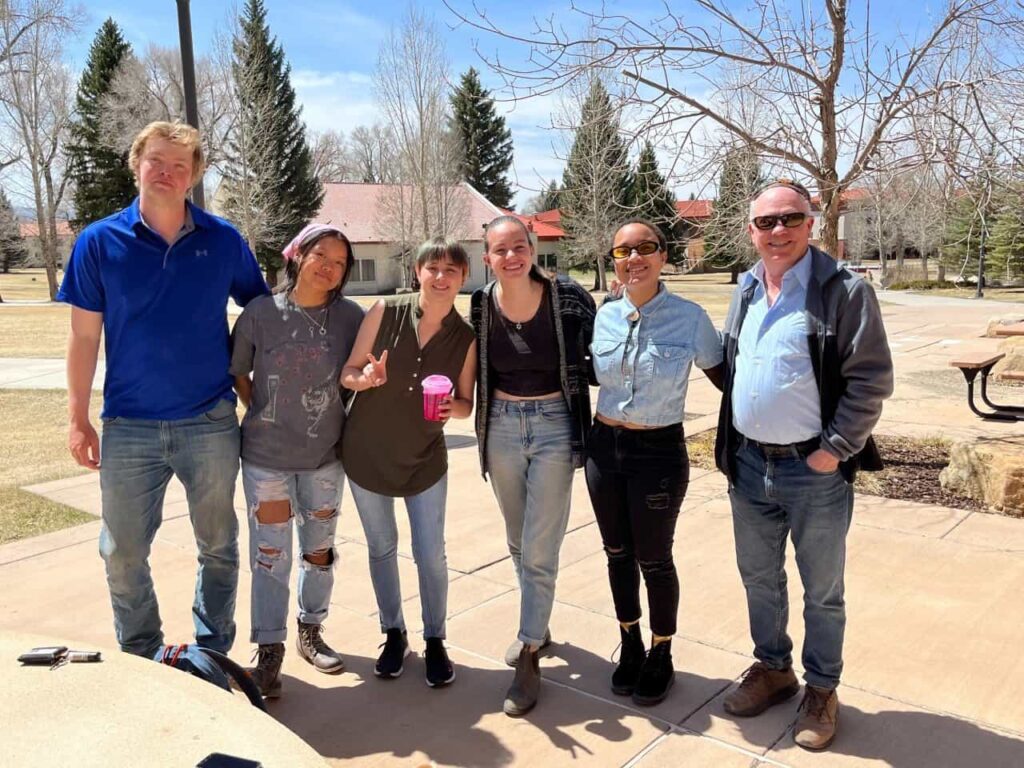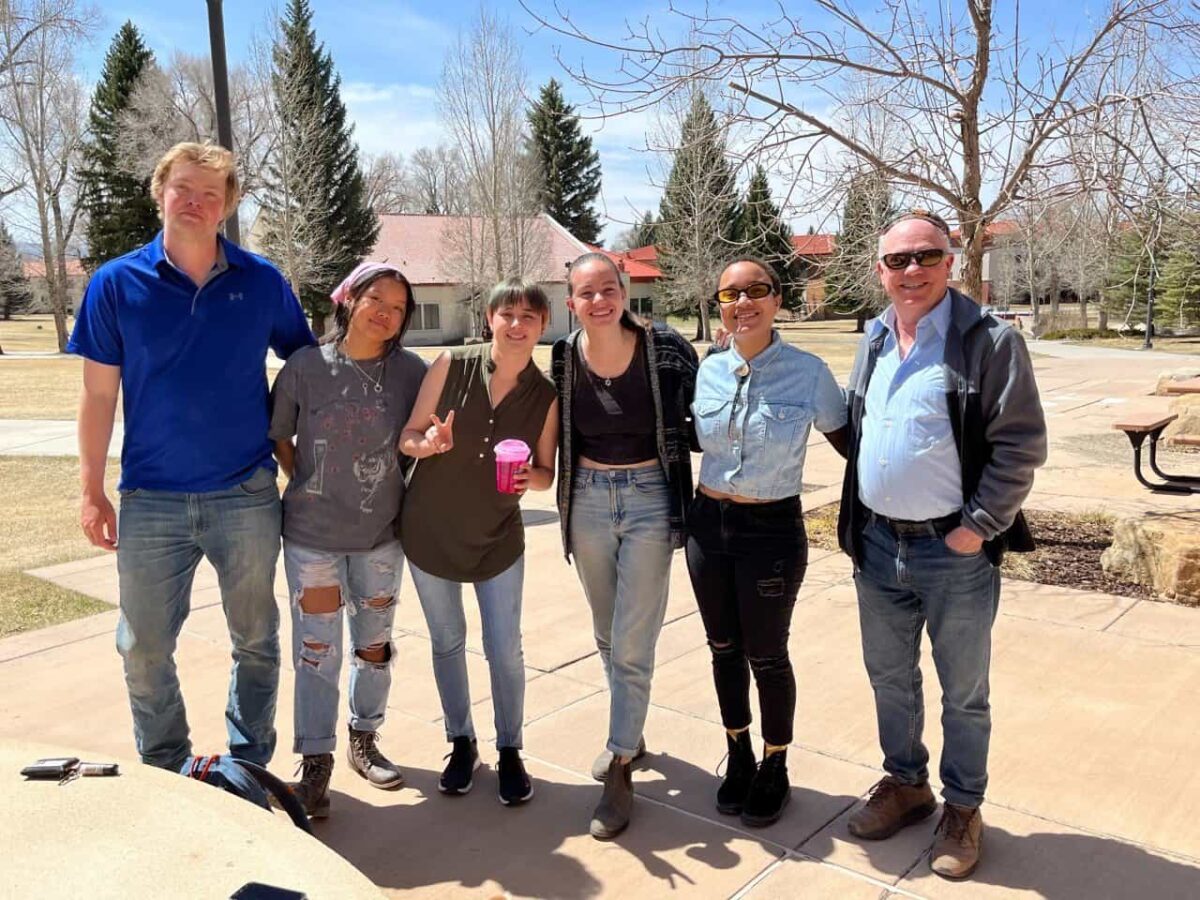
Conversations around environmental topics can frequently devolve into doom and gloom sentiments (thus the recently coined term “eco-despair”, or eco-grief), and focus entirely either on the cold, hard science or the harsh political realities that so often dominate the discourse. But there’s a new environmental organization on campus: GreenFaith, which aims to broaden the conversation around environmental issues on campus to include considerations of faith and spirituality.
Founding members Lyndsey Gaddy and Solomyn Collen are finishing their second year of Environment and Sustainability (ENVS) studies, and are both on pace to join the 3+2 track of Master’s in Environmental Management (MEM) program.
Gaddy and Collen share the title of Co-Directors of Western’s newest environmental club. The club’s third founding member, Jeanea Blair, a second-year MEM student, acts as a graduate liaison and mentor, connecting the club to her master’s project, which is focused on building a cultural park at the base of the trail system behind campus leading to Signal Peak.
Blair’s park will serve as a workspace for GreenFaith students to decorate and paint while having discussions about how people’s varying faiths connect them to the natural environment. Gunnison’s sister city in India, Majkhali, boasts a similar park that served as the inspiration for Blair’s project and celebrates the connection between the people of Majkhali and their surrounding natural environment.
Gunnison and Majkhali’s sister city relationship was established in the summer of 2018 when a cohort of Western students traveled to India to undergo a cultural exchange and study concepts of mountain resiliency. Blair’s aim is to jumpstart a parallel conversation around faith and the human-environment relationship here in Gunnison, using the park as a convening space and a launching point for multi-faith conversations.
Her vision for the park includes a large gazebo space featuring a seating area, surrounding gardens, and accompanying artistic creations, including ceramics and other art which will connect the park to local natural and cultural heritage.
The space will also feature a sculpture that emulates the water cycle, symbolizing Gunnison’s status as a headwaters town. Due to some local funding issues related to Covid-19, the construction has been delayed, but will hopefully be completed throughout the summer and into the fall of 2022.
“What can we learn from [the people of Majkhali] about how to be better land stewards, how we can tie that to our faith, our culture? Also, how can we learn those things from other people in the Valley?” asks Blair. The monument space will not only act as a community space for club meetings and interfaith discussions around the environment, but also as a peaceful, welcoming rest stop for trail users and students on campus.
As for the club’s inception story, Gaddy notes that Dr. Kate Clark, a Western ENVS professor, sent out a list of prospective ENVS student clubs in the spring of 2021, which included a faith-based organization that would be dedicated to open dialogue around religion, belief, and the environment.
A few connecting emails later, all three were on board. “GreenFaith got involved because we were looking at other organizations that are doing stuff like this, and I think Lyndsey looked it up: just [searched] ‘GreenFaith’, literally what it’s called, so it was the first thing that came up,” says Blair with a grin. The trio quickly decided to join GreenFaith’s larger organization umbrella, officially becoming GreenFaith: Gunnison.
GreenFaith is an international nonprofit that works across all belief systems and around the globe in a transformational effort to inspire “reverence” and passion for life on Earth. Their mission statement reads: “Because the Earth and all people are sacred and at risk, GreenFaith is building a worldwide, multi-faith climate and environmental movement. Together our members create communities to transform ourselves, our spiritual institutions, and society to protect the planet and create a compassionate, loving and just world.”
“A majority of people on Earth are religious in some way. So their views tackle sustainability and the top 10 pressing environmental issues through that lens, to try to bring in more people,” says Gaddy.
GreenFaith’s global work takes them to churches, temples, mosques, and other places of worship and spiritual connection in search of environmental connection, understanding, and action with the more than 80 percent of the global populace that identifies themselves as believers in one or more faiths or belief systems.
Collen says Western’s version of GreenFaith places an emphasis on the interfaith aspect, noting that none of the three founding members identify as Christian, which differentiates them from many other Faith-based environmental organizations, particularly in the U.S. “[We want to] bring people together, create an environment where we can learn about each other, [and] an environment of tolerance and acceptance,” she adds.
Gaddy adds that the club is intended to be a welcoming space for the non-religious, and for those questioning and seeking answers regarding their personal faith. “College is a very big time to sort of question what you do believe in, so [GreenFaith] is also a place to come hear about different faiths from a person who follows that faith,” she notes.
GreenFaith is hoping to fill a gap in the discourse around environmentalism and the environment, notes Blair. Often, the conversations and work of students and environmentalists remain stay within the realm of science and politics, and don’t extend into the spiritual or religious realm.
This tendency is at odds with the great importance of these beliefs to many people’s identity and broader worldview, which drives the question: How can people work honestly towards environmental solutions when they are frequently expected to set aside their personal beliefs that drive their views on environmental topics?
At their first meeting in the fall of 2021, Blair says it was a breath of fresh air to hear fellow students talking about their relationship to the environment in personal, spiritual terms. At that first meeting, the club kept the mood light, playing board games and getting to know each other.
Down the line, GreenFaith hopes to work in conjunction with local churches on various aspects of environmental stewardship and sustainability, as well as bringing in local faith leaders as speakers, like Rabbi Mark Kula, who spoke with club members about Judaism and its longstanding environmental connections outside the University Center on April 18.
Blair also envisions a future for the club that would include guest speakers from organizations she has worked with like UN Mountain Partnership and Sister Cities International, as well as speakers and students from the Gunnison Valley that can bring their own experiences and backgrounds to the space. This could include club members or fellow students sharing their religious practices, beliefs, and traditions centered around specific holidays.
For now, the club is doing their best to launch on campus and build their membership in difficult, unpredictable circumstances. As much as possible, the club plans to hold outdoor meetings that promote a connection with nature.
Gaddy adds that the initial plan for meetings, before Covid-19 interruptions, was to set aside an hour of time for club members and interested students to come in and engage with an aspect of their faith that they otherwise don’t always make time for, whether it’s journaling, reading a religious text, meditating, or another form of spiritual or religious practice.
You can find GreenFaith: Gunnison on Instagram @wcu_greenfaith or email Blair at jeanea.blair@western.edu to learn more.

